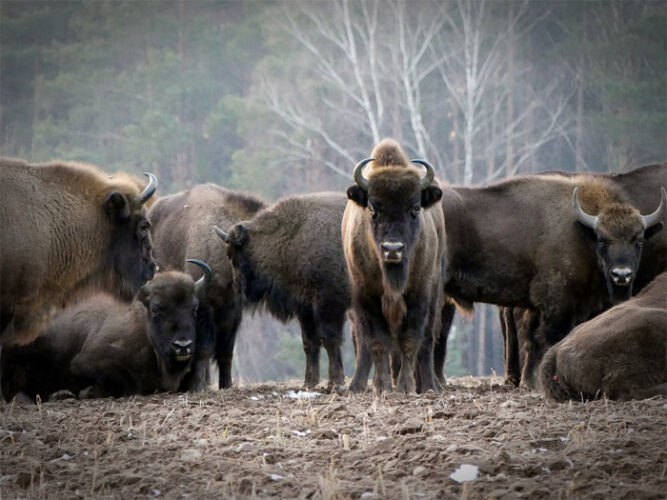(Photograph above of European bison in Poland)
A round-up of environmental news that’s been overlooked recently.
By Colin Serjent
Bison back in the UK for the first time in 6,000 years
A rewilding project that will bring bison back to the Kent countryside in 2022 could pave the way for free-roaming herds of the animals across the UK within decades, conservationists believe.
A small herd of bison will be released into Blean Woods in Kent – the first time they will have lived on the British Isles for more than 6,000 years.
Beetle that walks on water….upside down!
A beetle that can walk upside down on the underside of the water’s surface has been found in Australia.
it is the first time such behaviour has been witnessed. Researchers believe the quarter-inch insect belongs to the Hydrophiladae family, known as water scavengers.
It appeared to have a layer of trapped air along its abdomen pushing it against the surface. The behaviour is thought to have evolved as a means to avoid predators.
Double rainbows
This is when a faint, secondary rainbow appears above the first one. They are caused by light reflecting twice inside the raindrops. This second reflection causes the colour sequence of the rainbow to be reversed.
Animals with short lifespans
Adult mayfly – 2 days
Dragonfly – 2 weeks
Housefly – 4 weeks
Bee – 5 months
Monarch butterfly – 9 months
Mouse – 1 year
Robin – 1 year
Octopus – 1.5 years
Seagulls can have a long lifespan, living up to 40 years
Please drive slowly: hedgehogs crossing here
A recent study stated that 335,000 hedgehogs were dying on Britain’s roads every year – a three-fold increase on the estimate for 2016.
There are believed to be around a million hedgehogs across Britain, compared with 30 million in the 1950s. Conservationists have blamed the disappearance of hedgerows and copses which have resulted from intensive farming.
Aims to ensure curlews’ future
With their long, curved beaks and distinctive calls, curlews are among Britain’s most recognisable birds – but are increasingly difficult to spot.
The UK is home to a quarter of the world’s breeding population, but since 1995 their numbers are down by almost 50 per cent. The curlew is now a red-listed and near threatened species.
Airfields put the birds in more danger. Because of the so-called threat birds pose to aircraft, licensed airfields are allowed to destroy curlew eggs on their grounds.
Abuse at abattoirs caught on video but no one watches it
Animals are being abused in slaughterhouses in front of CCTV cameras but no action is being taken because the video is not being checked.
The government had claimed that making cameras compulsory in slaughterhouses from 2018 would “cement the UK’s position as a global leader in animal welfare standards.”
Animal Justice Project (AJP) secretly placed cameras beside official CCTV at G&GB Hewitt in Chester. It filmed cows being beaten with sticks and struck on sensitive areas with electric prods; animals being cut and kicking, apparently still conscious after being stunned too briefly; and a piglet placed in hot water while evidently still alive.
